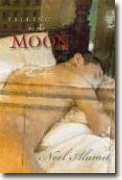Talking to the Moon
Noel Alumit
book reviews:
· general fiction
· chick lit/romance
· sci-fi/fantasy
· graphic novels
· nonfiction
· audio books
· author interviews
· children's books @
curledupkids.com
· DVD reviews @
curledupdvd.com
newsletter
win books
buy online
links
home
for authors
& publishers
for reviewers

 |
Talking to the Moon Noel Alumit Carroll & Graf Paperback 300 pages December 2006 |
|
The tragic hate-motivated shooting of Jory Lalaban irrevocably alters his life and leaves his wife, Belen, and his son, Emerson, staggering through their days in shock and disbelief. An ex-nurse, Belen is working at her job as a care provider at the time of the accident, looking forward to a secure, comfortable retirement, even the prospects of paying her mortgage off.
As Belen calls upon her inner strength, the patchwork quilt of her and Jory's life steadily unfolds, from their childhood in the Philippines to their arrival in America almost forty years ago. Both were on the run from the shame placed on Belen by her wealthy, class-conscious mother, who wanted her to marry a successful politician and not run off and get pregnant by Jory, a poor working-class orphan. While Belen fearfully prays at her husband's beside, Emerson's reaction to the event is intuitive as the mayor, the federal government and the Jewish community move quickly to denounce the crime. Emerson helps present a united front to the press, speedily condemning the killer as a thug and as subhuman. Yet Emerson remains a haunted man, uncommunicative and sullen. Estranged from his mother over the issue of his sexuality for quite a while now, his heart is also weighed down by the long months of sorrow after his boyfriend, Michael, a Taiwanese flight attendant, unceremoniously discarded him. It is only through listening to imaginary phone calls and the haunting specter of his dead brother Jory "Jun-Jun" Jr., that Emerson can seal off the pain of this terrible tragedy that has afflicted his family. Jory is barely functioning, lying motionless, eyes closed, barely speaking. As he slips away, he recalls his past when as a boy he was bought to St. Teresa's orphanage in the Philippines, where Father Ryan, an American priest, received him. Gravitating in and out of consciousness, Jory finds strength in the natural spirits, the power of the Moon, and Belen, "his woman who gave flavor to the moon." Soon enough, however, reality strikes when Belen realizes that the rising hospital costs may cripple them financially. There is still the question of whether Jory will actually survive his life-threatening injuries. The tragedy has taken a terrible toll on the Lalaban family as they all turn inward to cope, seeking comfort in the past. Author Noel Alumit bases his fictional tale on a real event: on August 10th 1999, Buford O. Furrow, Jr., a self-avowed white supremacist, went on a shooting rampage at a Jewish Community Center in Los Angeles. Furrow ended up gunning down Filipino mailman Joseph Santos Ileto while he was delivering the mail eight miles away. This event, however horrible, proves to be fertile subject matter as Alumit uses the crime to ingeniously entwine together the contemporary issues of racism, the immigrant experience, and the fragility of human sexuality. In the end, the novel is about the constant circle of life, a delicately written homage to life's invariable ebb and flow, with the simple themes of acceptance, forgiveness and even salvation belonging to its core. Originally published on Curled Up With A Good Book at www.curledup.com. © Michael Leonard, 2007 |
|
|
|
 Click here to learn more about this month's sponsor! |
|
| fiction · sf/f · comic books · nonfiction · audio newsletter · free book contest · buy books online review index · links · · authors & publishers reviewers |
|
| site by ELBO Computing Resources, Inc. | |
 Nothing, however,
can prepare Belen for the phone call from Jory's boss. The effect of the news on her is as traumatic as anything
she has experienced in her whole life. With her husband lying in hospital, riddled with bullets and on the cusp of death, Belen turns to her deeply held Catholic faith, anxiously praying to the Virgin Mother for salvation.
Nothing, however,
can prepare Belen for the phone call from Jory's boss. The effect of the news on her is as traumatic as anything
she has experienced in her whole life. With her husband lying in hospital, riddled with bullets and on the cusp of death, Belen turns to her deeply held Catholic faith, anxiously praying to the Virgin Mother for salvation.